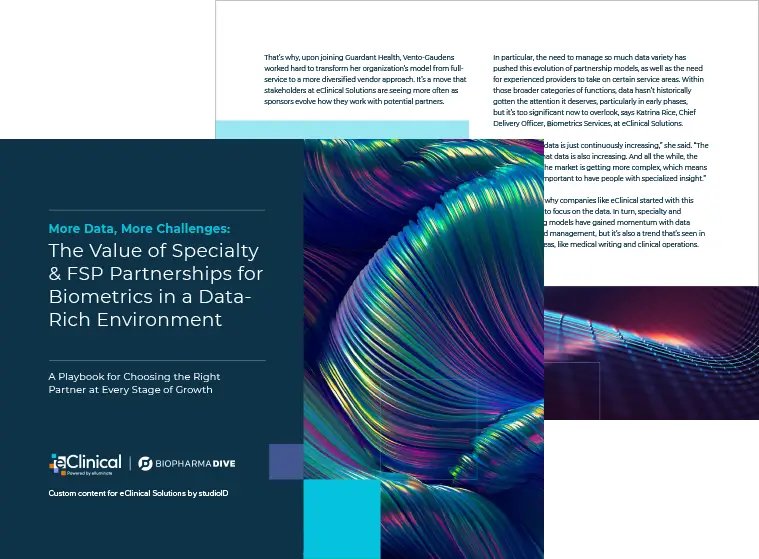
The Value of Specialized Partner Models in a Data-Rich Environment
As the life sciences data ecosystem continues growing in volume and complexity, being able to understand, manage, and drive clinical development decision-making based on insights from that data is paramount. However, using undifferentiated legacy tools and strategies to accomplish those goals is increasingly insufficient and ineffective.
In this challenging environment, pharma and biotechnology companies accustomed to relying on full-service clinical research organizations (CROs) to conduct trials and manage associated data may benefit from switching to a new generation of clinical development outsourcing models with specialty CROs. Transitioning to such partnership models can enable organizations to access deep data stewardship expertise to support and advance specific development and portfolio growth stages.
In a recent webinar with industry experts from Halloran, Dynamicure, and eClinical Solutions, panelists discussed differences between traditional all-purpose CROs without specific data management expertise and newer data-focused specialty CROs. They highlighted strategic advantages for trial sponsors in partnering with specialty service providers and shared predictions for how they expect the life sciences industry to evolve in 2024 and beyond. Let’s take a look at the key takeaways from their insightful conversation.
Specialty providers can meet the needs of trial sponsors by providing data management expertise that full-service CROs do not have.
The main difference between full-service CROs and specialty providers is their core expertise. If expert, end-to-end data management is the goal, full-service CROs typically lack that due to the value proposition of full-service CROs servicing every single part of clinical development. As such, they do not have data management as a top priority, nor do they have the necessary expertise to do data management for the benefit of the trial sponsor.
“Not that there isn’t room for large CROs—absolutely, there is. But you leverage them for what they’re good at, which is footprint. The clinical monitoring aspect where you have CROs across the globe running phase III trials and things like that, that’s their wheelhouse,” Igor Proscurshim, Head of Clinical Development at Dynamicure, said.
By contrast, specialty CROs are completely dedicated to collecting, understanding, and leveraging data for the benefit of their clients. And because data management is their core expertise, they are often able to surface unique insights that go above and beyond what sponsors may have expected.
With a specialty CRO, you end up getting a lot more than just the data. You can rely on their experience in handling data to help you see things that you didn’t even know you had to see.
Igor Proscurshim
Dynamicure
Sponsors often choose full-service CROs because of the perceived advantages of dealing with a single vendor, rather than overseeing multiple providers for different parts of the clinical development process. However, the risks associated with this strategy due to data integrity requirements and regulations—and traditional CROs’ lack of data management expertise to ensure compliance—can outweigh the benefits.
For example, to compensate for their data management deficits, large CROs often outsource some of the work to third-party data providers. Thus, in effect, trial sponsors end up outsourcing to multiple providers anyway—just without being aware of it. “As a sponsor, you become one level further removed,” said Meaghan Powers, Director, Clinical Operations Practice at Halloran Consulting Group, noting that under such arrangements, sponsors are still the ones that are ultimately responsible for overall compliance oversight.
Working with a specialty provider can reduce risk, even if it means another vendor to manage. Considering data management is such a central piece to any study, it’s key to make sure that your partners are top-notch.
Meaghan Powers
Halloran Consulting Group
Partnering with specialty CROs has important benefits for trial sponsors’ data management teams.
At the trial setup stage, one of the key benefits that pharma companies partnering with specialty CROs can and should expect is an understanding of how the CRO will bring together the multiple complex, diverse datasets that form part of modern clinical trials in a way that is reportable to regulators.
“That specialty provider has to help the sponsor, who often doesn’t actually even understand the complexity of [the data]. Having that experience and knowledge to put all of that together and show how it goes together is critical,” Proscurshim said.
At the trial execution stage, sponsors should expect in their specialty CRO partners to have the capability to not only capture and ingest the data, but also map and present it in a way that enables clients to make clinical development decisions based on that data.
The big idea is that the CRO should be not just a data solution provider, but rather a partner that, in Proscurshim’s words, “helps come up with solutions to things that the sponsor might not even understand that they need—and that’s not trivial.”
That includes the ability to help clients strategically question whether they even need to collect all the data they think they need. “As a sponsor, having that focus on why we are collecting [a given type of] data is incredibly important,” Powers said.
“Specialty CROs ultimately remind sponsors that they are accountable for the quality and the usability of their data. From the get-go, they help them keep a pulse on that.”
– Meaghan Powers, Halloran Consulting Group
Lastly, specialty CROs that are open to giving their clients the tools to oversee them as well can go a long way toward building trust-based sponsor relationships and partnerships. “As a data provider, we need to be helping our sponsors oversee how we’re working, so they can measure us and make sure that we’re delivering to their needs,” said Katrina Rice, Chief Delivery Officer, Biometrics Services, at eClinical Solutions, representing the specialty CRO perspective.
Industry trends expected on the horizon include advances in data integration and applications of AI/ML technologies.
One of the pharma industry’s most important goals for 2024 and beyond is developing capacity for advanced integration of different sources of data, including wearables and patient-reported outcomes data, and driving drug development decisions based on the picture that emerges from those data integrations.
With clinical development costs increasing year after year and the widespread challenge of enrolling trial participants, there is a push for making decisions based on more comprehensive data from fewer patients—which better data integrations can also help achieve.
“The idea is to maximize data on a patient level, but minimize it across multiple patients, so fewer patients mean more data,” Proscurshim said.
Data integration notwithstanding, the continuously growing volumes of clinical data will likely render any optimization futile without also leveraging artificial intelligence (AI) and machine learning (ML) tools and technologies at the quality review stage. “With this volume of data and without using AI and ML, we won’t be able to get to faster data insights and faster decisions,” which is ultimately the goal of partnering with specialty CROs, Rice predicted.
Against this backdrop of rapid data transformation, there is an industry-wide recognition that clinical data management must transform towards a clinical data science model, with emphasis shifting towards identifying trends and generating insights. According to the Society for Clinical Data Management1, this transformation success will rely not only on optimizing people, processes, and technology but on effectively leveraging partnerships.
Alongside the previously discussed benefits of closer partnerships, deeper expertise, and more proactive risk management, it’s clear that specialized, data-focused outsourcing partnerships also stand to play an integral role in equipping sponsors for the future of modern clinical trials.
eClinical’s Biometrics Services team helps sponsors of all sizes to reduce cycle times, enhance productivity, and confidently navigate this increasingly complex clinical data landscape with end-to-end solutions from acquisition to insight.
Download our eBook, ‘The Value of Specialty & FSP Partnerships for Biometrics’, to learn more about how this new generation of data-focused outsourcing models is enhancing productivity and enabling tomorrow’s breakthroughs.

The Value of Specialty & FSP Partnerships for Biometrics
Author

By submitting, you agree to the processing of your personal data by eClinical Solutions as described in our Privacy Policy.







